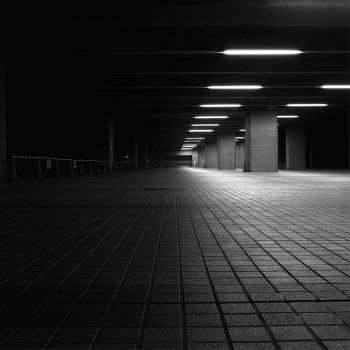Some albums take a bit of getting used to. Oren Ambarchi’s new brooding instrumental Sagittarian Domain, a 33-minute sprawling Krautrock tempest, is one of these albums. It’s not accessible by any means, and it isn’t immediately gratifying; instead, it’s an album that requires investments of time and patience, and one that could easily put a lot of people off due to its high-demand style.
Of course, fans of Ambarchi, who has previously worked with bands such as Sunn O))), will be used to music that requires a bit of extra thought, and so it’s unlikely that many will dislike Sagittarian Domain when giving it the time that it rightly deserves. Starting off as a ripple of evil guitars and screeches isn’t too unusual, although there’s a great sense of tension built up, that elevates further when Ambarchi’s strong percussion takes centre stage. A gifted drummer, Ambarchi’s bass and percussion rhythms are emblematic of the sort of Krautrock groove that Neu! once pioneered, and bands such as Porcupine Tree explored in jam sessions like Metanoia.
Repetitive for a period of time, Ambarchi finds a particular groove and remains there comfortably, occasionally changing time signatures, but apart from minor tweaks to the groove, keeping everything consistent. Having grown up with Can’s Future Days and having delved more recently into albums such as Fujiya & Miyagi’s Lightbulbs, it’s refreshing to hear a musician who continues this vein of constructing repetitive grooves to get lost in.
As with much of Krautrock’s output since the ’70s, the temptation to get lost is high. While Ambarchi is a competent musician, a lack of variety throughout a good portion of the track is both a feature of the kind of music that he makes and an obvious flaw to it. There are subtle changes made throughout, and everything builds in a satisfying and tense way, but at times the temptation to pause the music and take a break seems irritatingly high, given the relentless nature of Ambarchi’s similar-sounding onslaught. Nevertheless, the incorporation of electronics undulating between the right and left speaker as the track builds adds a gripping additional layer to the carnage.
The more the album builds, the more Ambarchi makes it his mission to ramp up the chaos: distorted guitars rip and tear through the music; weird, broken electronics groan; and everything feels as if it’s about to burst open at the seams. All the while, Ambarchi is clearly enjoying his chance to experiment with studio trickery and effect pedals. And then, realising that there has to be an obvious pay-off to the half-hour build, the music slows down to an ambient crawl, with beautiful violins suddenly rippling through the darkened canopy and odd voice-clips reverberating as if part of a dream, reminding the listener of Eluvium’s Copia.
Ambarchi’s soft finish is a testament to his ability to manage both tense and chaotic sounds, as well as those designed to be attractive and welcoming. The marriage of both on Sagittarian Domain seems to be at odds with itself at times, with a lot of the track weighted towards the former. And, while Ambarchi’s musicianship can never be called into question, his choice to release a single-track album that builds for a relatively short, if lovely, pay-off, is something that can be both praised and criticised. It’s all very well-done, but it’s not something that you’ll feel much incentive to revisit over and over; an experience worth taking, but not necessarily one worth repeating.

